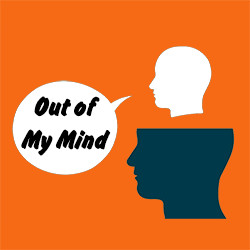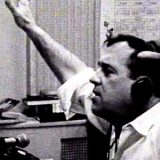Out Of My Mind—Episode 2 Show Notes
 Why It’s Time to Set Free The Coins You’ve Been Hoarding For All Those Years with Scott Sutherland from Huntington Rare Coins and Precious Metals
Why It’s Time to Set Free The Coins You’ve Been Hoarding For All Those Years with Scott Sutherland from Huntington Rare Coins and Precious Metals
To visit Scott and Huntington Rare Coins and Precious Metals on the web, click here.
Scott Sutherland explained that the public, that’s you and me, have the wrong expectations about that jar of coins we’ve been slowly filling up for decades. While only a few rare coins were ever minted, television shows and Internet sites such as Ebay give us the impression that ordinary coins are worth something simply because they’re old or they’re no longer being minted. Sadly, when we bring our collections of potential this-is-better-than-winning-the-lottery coins to someone like Scott, he’s stuck delivering the bad news: your coins are worth something, but that something has to do with the copper or silver content in older coins, not their age or scarcity.
Nevertheless, it’s best to check before spending your hoard or blindly depositing it in the bank. A good place to start is the Internet…if you’re careful about interpreting what you find. As a show notes extra, Scott offers these tips to using the Internet wisely:
- stick with reputable sites. Check the American Numismatic Association website for a dealer/member. Registration, alone, isn’t a sign of reliability, but it’s a good start. Shun sites that use phrases that offer (or guarantee) that your coins are valuable, especially before they’ve seen them. No matter what the promise, remember that past performance doesn’t guarantee future performance;
- compare both the price and condition of any coin valuation. Age, alone, does not determine the value of a coin, even a rare one. Make sure you are making an apples to apples comparison;
- make sure any valuations represent what a buyer is willing to pay or what a coin sold for. The value at which a coin is offered, say on eBay, is meaningless unless it’s a price someone paid. Anyone can set any asking price he or she wants to set;
- never send your coins to a potential buyer through the mail unless you are absolutely certain the buyer is legitimate. Remember, once the buyer has your coins, he or she is running the show. You can’t even get a second opinion because you don’t have the coins to show to another potential buyer.
Selling your coins wisely is a matter of managing your expectations. Understand the odds of winning the lottery by having a rare coin in your collection are small, however there is some value in what you have. Rather than dream of a big payoff, get an idea of what your coins are worth, then take them to a reputable coin dealer for an estimate.
Applying the Art of Doing It Yourself to Choosing a Lawyer with Gary Blasi
All too many people in small business shy away from engaging the services of a lawyer. Some feel what they’re doing isn’t truly a business (say if you’re renting out a room). Others are concerned about the expense, especially as the business ramps up. Still others believe all they need to know is available on the Internet.
This sort of thinking can have unexpected, and undesirable, consequences according to Gary Blasi, an emeritus professor of law at UCLA, a practicing attorney and an avid do-it-yourselfer. His recommendation is applying the same kind of reasoning and care to working with a lawyer as you do (or did) to do-it-yourself projects in the past. You do some of the work while your lawyer does the rest. The dividing line is based on what you can reasonably handle yourself. It’s very much like deciding whether or not you need to call a plumber or electrician to fix a problem around the house. Not every job requires a specialist, but if you’re afraid of flooding the kitchen or electrocuting your dog you don’t gamble. You call an expert.
Gary says that it’s perfectly proper to have a do-it-yourself discussion with a prospective attorney. Under the canon of ethics, the client is always the boss. She is responsible for all major decisions and is entitled to know everything an attorney is doing on her behalf. If an attorney isn’t comfortable with that arrangement, find another one.
In a show notes extra, Gary has this advice. If you are going to work with your lawyer, start by reading up on legal issues surrounding your part of the job. He suggests looking into books from reputable do-it-yourself legal publishers such as Nolo.
Keep in mind these are general guidelines that Gary is offering. Every legal situation is different, and if you have any doubts about what to do in your situation, consult a lawyer.
To visit Nolo on the web click here.
The Social Media Life of Doughnuts with Katie Wagner
To read more about Katie Wagner and Katie Wagner Social Media click here.
It’s hard being hip these days. In addition to everything we had to know about when we were growing up, there’s the question of committing an unpardonable faus paux on social media. You never want to like something on Twitter or tweet something on Facebook.
Or is it the other way around.
Katie Wagner knows the answer, and she explains the correct way to document your love of doughnuts on social media from Twitter to Google+.
Your kids and grandkids will think you’re so rad. Or cool. Or is it phat?
The Death of AM Radio—Part 2
In episode one, I discovered that AM radio was burdened with technical, perceptual and financial problems. Taken as a whole, these problems seemed to be getting in the way of allowing AM radio stations to do what they historically did best—build communities. It was that community building, that sense of being in contact with others who shared the same life style, struggles, experiences and joys that was threatened by AM radio’s possible extinction, and yet it was exactly that community building that connected us with AM and that we ought to be passed along to future generations. Translators, low power FM stations AM stations can use to rebroadcast their programs, will allow AM stations to fill in the holes in their coverage area, giving AM radio a second chance to build communities. But what if AM station owners don’t make use of that chance? From what I’ve learned, if AM radio stations fail to return to the local focus that defined them for nearly 60 years then no advances in technology or image-building will save AM radio from itself.
I could not have put this story together without the help of broadcasting guru Jay Mitchell, who opened many doors for me, and Dennis Wharton, Executive Vice-President of Communications for the National Association of Broadcasters, who arranged the interview with Commissioner Pai.
Music
The Out Of My Mind podcast theme by Silent Partner.
Contacting the Show
Email: jdouglas@thetheaterofyourmind.com
On the Web: Contact Out Of My Mind
Write: Out Of My Mind | The Theater of Your Mind, Inc. | 2215 Fern Dell Place | Los Angeles, California 90068
Book Jay Douglas as a Speaker, Podcast Guest or Consultant
Call 323-856-1795 for availability.









